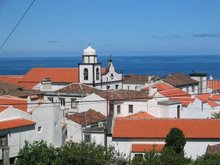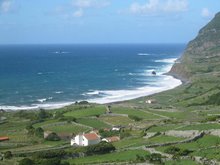It's Portuguese for "Strawberries with Sugar" and is the name of a long running kids' soap opera on Portuguese TV - it's sort of half way between Grange Hill and Hollyoaks.
During the school summer holidays, it becomes Morangos com Açucar - Férias de Verão ("Summer Holidays") when the cast decants from their school in Lisbon to a resort on the Algarve and take their clothes off. Well not all of the cast: girls with fat thighs and hairy moles - only included in the fully clothed winter version of McA in a token nod in the direction of diversity - are left behind with the fat boys. If there were a summer holidays version of Eastenders, then Heather ('Ev) Trott would not be in it. Nor would Shirl or - and now I come to think of it, anybody. Not since Kara Tointon left, anyway ...
Thus, Anabela is guaranteed a suntan in Cascais this summer:-
... whereas Papoila can look forward to a summer of wiping tables at a motorway service station north of Santarem
Anyway, I've digressed - how did I get on to this? Oh yes, Morangos, naturally I have no interest whatever in watching skimpily clad teenage girls (especially once the fat and unattractive ones have been weeded out leaving only the svelte ones with tight sweaters and short skirts (Ooh! Suits you! Ooh!) for the middle aged viewer's delectation), no, it's because McA has CeeFax 888 subtitles and thus it's a good Portuguese lesson.
Seriously - tonight I learned that se não te importares means "if you don't mind" (said to someone you're on familiar terms with). And cheira tão bem means "smells really good" in the context of cooking. And if you think that's not very important to know, there are often lots of things cooking smelling really good (if you don't me mind saying) when you walk down the main street of Fajã Grande around lunchtime. In fairness, my Portuguese is not so bad that I didn't know that these expressions would be something like that but you always have to be careful that some idiom in English doesn't translate exactly into Portuguese. So it's great to be able to watch the subtitles on McA and get confirmation.
I wonder what's the Portuguese for "You're damn right it is" (Pois e?) in the context of the reply to "Do you think my arse is too fat to get a part in McA - Ferias de Verão?"
Subscribe to:
Post Comments (Atom)








8 comments:
Neil - I'm an author who is interested in one of your Hebridean photos to illustrate a book. Could you contact me via newsdesk@whfp.co.uk
best,
Roger Hutchinson
hehehhe, that´s funny, I never (never) watched McA, but a I have an idea. The same happened to me "au contraire", with Dallas, when I was young.
As for the translation, "pois é",in this case, it's too smooth....You bet/podes apostar! would be better ;)
Conversely, there are a couple channels I've watched in the Azores -- one's called The Hollywood Channel -- that carry English-language (mainly US) TV series and films with Portuguese subtitles, which are fun for practicing one's reading!
Hurray! You're back. I'm very pleased, although your Portuguese must surely be up to scratch now as you have been avid viewers of McA since you arrived in Flores........
How about some "dish" on the [i]News of the World[/i] scandal?!? I'd love to see the Murdochs get their nuts caught in a ringer :-)
Impressed as I was with the feature upon your admirable and individual lifestyle in the Sunday Express at the weekend( http://dailyexpressproperty.co.uk/articles/view/9/811 ), I cannot help but suppose that it may bring in its wake a torrent of Express readers more Papoila than Anabel. I hope that you have been practising your chat on house prices and immigration control...
Congrats, Carol and Neil!!!
David, thanks for the heads-up -- lovely article. Will add a link to it on the Azores tourism references page of my website.
Nice article, just a little correction, Flores has 3.791 inhabitants (2011 censos), in 2001 they were 3.995. But in the fifties it had 7.850 and back in 1900, they were 8.127.
Post a Comment